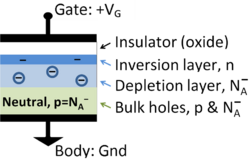User:John R. Brews/Draft: Difference between revisions
Jump to navigation
Jump to search
imported>John R. Brews No edit summary |
imported>John R. Brews No edit summary |
||
| Line 27: | Line 27: | ||
http://onlinelibrary.wiley.com/doi/10.1002/1521-4095%2820020605%2914:11%3C789::AID-ADMA789%3E3.0.CO;2-H/pdf | http://onlinelibrary.wiley.com/doi/10.1002/1521-4095%2820020605%2914:11%3C789::AID-ADMA789%3E3.0.CO;2-H/pdf | ||
http://books.google.com/books?id=iMSnDxI7JNsC&pg=PA181&dq=%22Schottky+diode%22&hl=en&ei=wkg7TdJ-jKKwA96_3IsD&sa=X&oi=book_result&ct=result&resnum=8&ved=0CFkQ6AEwBzgy#v=onepage&q=%22Schottky%20diode%22&f=false | |||
Revision as of 15:16, 22 January 2011
Schottky diode
The Schottky diode is a two-terminal device consisting of conductive gate (for example, a metal) on top of a semiconductor body. A generic name for this structure is the metal-semiconductor diode or M/S diode.[1]
Notes
- ↑ The term "Schottky diode" may be taken erroneously to refer to diffusion as the mechanism of operation as first proposed by Mott, Schottky and Davydov. However, the mechanism in most devices is thermionic emission, as later proposed by Bethe. See Chih-Tang Sah (1991). “§560: Metal/semiconductor diode”, Fundamentals of solid-state electronics. World Scientific, p. 474. ISBN 9810206372.
http://books.google.com/books?id=FPlJQ0iO7oQC&pg=PA134&dq="Schottky+diode"&hl=en&ei=iAg6TeO7AYSasAOk67WhAw&sa=X&oi=book_result&ct=result&resnum=8&ved=0CGIQ6AEwBw#v=onepage&q="Schottky diode"&f=false
